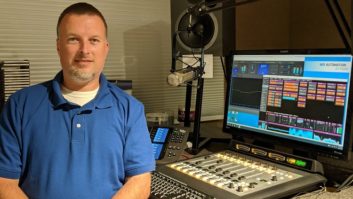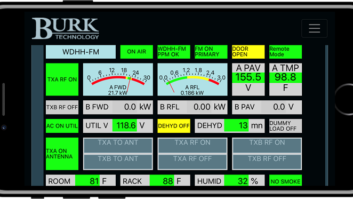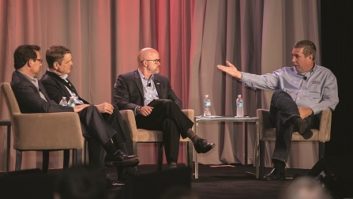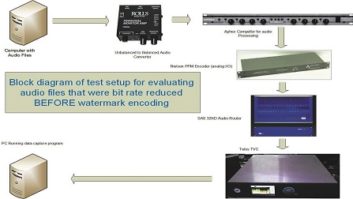For most radio stations, the biggest question when it comes to a musical presence on the Internet is whether or not to provide streaming audio.
Perhaps there’s some thought of offering a side channel or two, or experimenting with ad insertion. In an era when millions of computer users are programming their own formats by playing MP3 music files on their own machines, though, some radio stations are finding ways to turn the “MP3 revolution” to their advantage.
Music my way
How can traditional radio compete with the personalized music mix that a listener equipped with software like Napster or Real Jukebox can create?
At San Diego’s KSON(FM), the answer is right on the station’s Web site: a link to MP3.com, one of the first and largest MP3 sites, complete with an invitation to listeners to take advantage of “free music downloads.”
Some stations might see such a link as a concession to the enemy, but KSON’s Webmaster and midday air personality Nick Upton sees an opportunity.
“For us, it has given us a way to serve the local music community more than we could on the air,” Upton said.
While Upton’s playing the music of Faith Hill and Brooks & Dunn on the air, KSON’s Web audience has the opportunity to check out artists like Natisha Lynn and the Country Conscience Country Band, local musicians who have uploaded their songs to the KSON/MP3.com site.
“It was difficult to find room on the air for local artists, especially in the country format,” said Upton.
The local songs with the most downloads from the KSON/MP3.com site during the week do find their way to the airwaves at least once a week, when Upton hosts the Sunday morning “Country Download” show on KSON.
The station, owned by Jefferson-Pilot Broadcasting, gets the Web site for free from MP3.com in exchange for four minutes of ad time during the show each weekend.
A benefit to both sides
For MP3.com itself, partnerships with radio stations offer more than just a chance to barter for some free advertising time.
“Local music has turned out not to be a ratings-getter over the years, but (offering local music via MP3 files on the Web) is a way to serve that set of the community that wasn’t hearing what it wanted to hear on the radio,” said MP3.com Vice President/General Manager Terry Ash.
“What we took a look at was local stations having a traditionally low penetration for their Web sites,” Ash said.
By offering weekly charts of the most popular local and national MP3.com downloads, Ash said, stations can draw more listeners to their sites and keep them coming back more often.
Upton said the addition of MP3.com to the KSON site has increased traffic, with the promise of more to come.
“There are certain times where we could drive more traffic to the Web site by promoting it better on the air,” he said.
Another benefit MP3.com offers radio stations is its “Spirit 2000” program, which allows schools and colleges to create their own CDs of student-produced music, which are then sold online through MP3.com’s sites. Stations that participate in local schools’ Spirit 2000 programs can add their partnership to their public files to help them out at license-renewal time, Upton said.
The biggest benefit for stations, though, comes in the data MP3.com makes available to them. Stations have access to listeners’ e-mail addresses for their own marketing efforts. They also get detailed information on who’s downloading what.
“That, for a program director, has always been guesswork,” said Ash.
Build your own radio station
MP3.com is hardly the only player where MP3 and radio are concerned.
Over at Live365.com, the idea is to let listeners take their own music files and turn them into streaming “stations” that can be accessed from any Net-connected computer – and soon, thanks to a new partnership, the Kerbango Internet tuner that is expected to be on the market by year’s end.
“Some people would say that’s a threat (to traditional radio),” said Live365 vice-president of marketing Alan Wallace. “It would depend on who you are.”
Live365 is betting radio stations would rather work with the concept than against it. Through the company’s “Private Label Radio” service, the company is offering stations access to its own high-capacity streaming infrastructure to offer their stations’ audio online – as well as side channels full of music that complement a station’s broadcast format.
As the company looks beyond home computers to the future of the wireless Internet, Wallace said services like Live365 will be essential partners to get radio stations into new Internet listening environments, especially products like Kerbango and in-car players.
“It’s a great back end for a station to be able to thumb their noses at satellite radio,” he said.
Like MP3.com, Live365’s model includes interactive opportunities for listeners.
“(Stations) can turn around and go to your fans and say, why don’t you build a side channel for us,” said Wallace.
Wallace believes there’s a huge opening for radio to take advantage of opportunities like those Live365 is offering. After a radio career that included stops in Nashville, Phoenix, Houston and Los Angeles, he thinks listeners are ready for something new.
“We’ve put up with it (traditional radio) because we’ve had no choice,” he said.
Connecting with listeners
The key to the success of services like these, said one analyst, is to get to radio listeners where they do the most listening.
“So far the effect (of MP3s) is fairly limited,” said Malcolm Maclachlan of the consulting firm IDC. “About half of radio listening is in the car, and so far you can’t get the Net in the car.”
That’s changing, though. At recent trade shows, Live365 has drawn attention with its Chrysler PT Cruiser equipped with high-speed wireless Internet access connected to a high-powered sound system. Once systems like that move from the experimental stage to commercial reality, Maclachlan said, the threat to radio will grow.
“Anyone who wants to can stream major-label music content right now under the Digital Millennium Copyright Act,” Maclachlan said. The copyright issues that have plagued services like Napster, he said, stemmed from downloading music instead of streaming it.
The ultimate effect of the wide availability of MP3-based music online, Maclachlan believes, will be to force some changes back in the world of traditional radio.
“Radio will become more responsive to consumer demands, with broader playlists,” he said.












